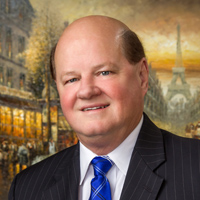Back Away from the Cliff! Managing Risk in a 24-Hour News World
If you’re a financial news junkie, realize that keeping a close eye on the daily headlines could steer you wrong over the long term if you’re not prudent.


Profit and prosper with the best of Kiplinger's advice on investing, taxes, retirement, personal finance and much more. Delivered daily. Enter your email in the box and click Sign Me Up.
You are now subscribed
Your newsletter sign-up was successful
Want to add more newsletters?

Delivered daily
Kiplinger Today
Profit and prosper with the best of Kiplinger's advice on investing, taxes, retirement, personal finance and much more delivered daily. Smart money moves start here.

Sent five days a week
Kiplinger A Step Ahead
Get practical help to make better financial decisions in your everyday life, from spending to savings on top deals.

Delivered daily
Kiplinger Closing Bell
Get today's biggest financial and investing headlines delivered to your inbox every day the U.S. stock market is open.

Sent twice a week
Kiplinger Adviser Intel
Financial pros across the country share best practices and fresh tactics to preserve and grow your wealth.

Delivered weekly
Kiplinger Tax Tips
Trim your federal and state tax bills with practical tax-planning and tax-cutting strategies.

Sent twice a week
Kiplinger Retirement Tips
Your twice-a-week guide to planning and enjoying a financially secure and richly rewarding retirement

Sent bimonthly.
Kiplinger Adviser Angle
Insights for advisers, wealth managers and other financial professionals.

Sent twice a week
Kiplinger Investing Weekly
Your twice-a-week roundup of promising stocks, funds, companies and industries you should consider, ones you should avoid, and why.

Sent weekly for six weeks
Kiplinger Invest for Retirement
Your step-by-step six-part series on how to invest for retirement, from devising a successful strategy to exactly which investments to choose.
Another day, another news story, another phone call from a client.
And that’s fine. I like talking to the people I work for.
What I really fret about are the calls I don’t get, and the people who are facing a 24-hour news cycle without a filter.
From just $107.88 $24.99 for Kiplinger Personal Finance
Become a smarter, better informed investor. Subscribe from just $107.88 $24.99, plus get up to 4 Special Issues

Sign up for Kiplinger’s Free Newsletters
Profit and prosper with the best of expert advice on investing, taxes, retirement, personal finance and more - straight to your e-mail.
Profit and prosper with the best of expert advice - straight to your e-mail.
Too much of a good news thing?
Lately, the news has been so positive – with reports about record days on Wall Street and the second-longest bull market in history – that I worry folks are getting a false sense of security. I’m like the grandfather whose grandkids are playing by the edge of a cliff, and everybody’s saying, “It’s OK, they’ve got another 3 feet before they go over.”
It’s not OK.
Because they think everything’s fine out there, they want to push things a little further … and a little further. They brush off warnings, and they’re slow to make decisions that could help keep them safe. Indeed, they might think they don’t need any supervision at all.
Why? Because they listen to their friends, or they watch a TV expert or they see something online, and they get the information completely out of context and try to apply it to their own retirement plans.
How the news can steer investors wrong
For example, I had a gentleman in my office recently who said he’d heard on TV that over the past three years, passive investment has outperformed active investment advice.
“Well, that’s probably accurate,” I told him. “And I hope that’s why you’re here talking to me. Because you’re not planning on being retired for only three years, are you?”
Of course he isn’t. He’s 70 years old, and he expects to live another 20 years.
“So, let me ask you a question,” I said. “Are you pretty confident the next 20 years will be just the same as the last three? Because that’s what you’re telling me was your take-away. And that just isn’t how it is in the real world.”
I reminded him of the motto we used in one of our seminars he attended: Our goal is to get you to retirement and through retirement.
Retirement can be a challenging time, and he’s about to enter that part of his life, moving from the accumulation stage to the distribution stage. The distribution stage is where you want to feel confident in your financial strategy. That’s where you need a coach and a trusted adviser.
“You’re paying me to help keep you from going back to work,” I said. And I gave him a little history lesson.
The S&P 500 over the last 15 years has averaged about 7%. But the trade-off is drawdown. Drawdown is from peak to trough, not performance in any one year. Think back a decade (if you dare): The S&P dropped more than 55% from its peak in October 2007 to its trough in March 2009. I don’t know many investors willing to gamble on losing 55% to make 7%.
Financial advice is about more than just performance
Speaking of comparing apples to oranges, it’s a mistake to assume that all passive managers outperform all active managers. Or to think that you’re paying less for their recommendations.
If you think that average 7% return would become 5.25% after you paid my fee, for example, you may be missing something. Because I invest efficiently; I do things specifically to help keep costs down. But that mutual fund you or you and your passive manager chose could have 2% in fees that don’t have to be disclosed. And there could be commissions and other fees on top of that.
The value of advice can’t be gauged on asset performance alone. Solid assistance from a knowledgeable, interested adviser can build confidence and have a positive impact on retirement readiness.
I remember when I was a kid, my grandparents would listen to Paul Harvey on the radio. And when he came back from a break he would say, “And now … the rest of the story.”
That’s kind of the way investing has become. You want somebody to tell you the rest of the story. And your trusted financial adviser is there to do that for you.
Kim Franke-Folstad contributed to this article.
Investment advisory services offered through AE Wealth Management, LLC (AEWM). AEWM and Roberts Wealth Management are not affiliated companies. Investing involves risk including the potential loss of principal.
Profit and prosper with the best of Kiplinger's advice on investing, taxes, retirement, personal finance and much more. Delivered daily. Enter your email in the box and click Sign Me Up.

Paul E. Roberts Jr. is the founder and chief investment officer of Roberts Wealth Management. He has passed the Series 65 exam and has insurance licenses in Texas, Louisiana, Mississippi and Alabama. He spent 22 years as a practicing CPA, then founded Roberts Wealth Management, a firm that focuses on estate preservation and retirement planning. His primary areas of focus are retirement income planning, investment management, 401(k)/individual retirement account (IRA) guidance and asset protection.
-
 Dow Adds 1,206 Points to Top 50,000: Stock Market Today
Dow Adds 1,206 Points to Top 50,000: Stock Market TodayThe S&P 500 and Nasdaq also had strong finishes to a volatile week, with beaten-down tech stocks outperforming.
-
 Ask the Tax Editor: Federal Income Tax Deductions
Ask the Tax Editor: Federal Income Tax DeductionsAsk the Editor In this week's Ask the Editor Q&A, Joy Taylor answers questions on federal income tax deductions
-
 States With No-Fault Car Insurance Laws (and How No-Fault Car Insurance Works)
States With No-Fault Car Insurance Laws (and How No-Fault Car Insurance Works)A breakdown of the confusing rules around no-fault car insurance in every state where it exists.
-
 For the 2% Club, the Guardrails Approach and the 4% Rule Do Not Work: Here's What Works Instead
For the 2% Club, the Guardrails Approach and the 4% Rule Do Not Work: Here's What Works InsteadFor retirees with a pension, traditional withdrawal rules could be too restrictive. You need a tailored income plan that is much more flexible and realistic.
-
 Retiring Next Year? Now Is the Time to Start Designing What Your Retirement Will Look Like
Retiring Next Year? Now Is the Time to Start Designing What Your Retirement Will Look LikeThis is when you should be shifting your focus from growing your portfolio to designing an income and tax strategy that aligns your resources with your purpose.
-
 I'm a Financial Planner: This Layered Approach for Your Retirement Money Can Help Lower Your Stress
I'm a Financial Planner: This Layered Approach for Your Retirement Money Can Help Lower Your StressTo be confident about retirement, consider building a safety net by dividing assets into distinct layers and establishing a regular review process. Here's how.
-
 The 4 Estate Planning Documents Every High-Net-Worth Family Needs (Not Just a Will)
The 4 Estate Planning Documents Every High-Net-Worth Family Needs (Not Just a Will)The key to successful estate planning for HNW families isn't just drafting these four documents, but ensuring they're current and immediately accessible.
-
 Love and Legacy: What Couples Rarely Talk About (But Should)
Love and Legacy: What Couples Rarely Talk About (But Should)Couples who talk openly about finances, including estate planning, are more likely to head into retirement joyfully. How can you get the conversation going?
-
 How to Get the Fair Value for Your Shares When You Are in the Minority Vote on a Sale of Substantially All Corporate Assets
How to Get the Fair Value for Your Shares When You Are in the Minority Vote on a Sale of Substantially All Corporate AssetsWhen a sale of substantially all corporate assets is approved by majority vote, shareholders on the losing side of the vote should understand their rights.
-
 How to Add a Pet Trust to Your Estate Plan: Don't Leave Your Best Friend to Chance
How to Add a Pet Trust to Your Estate Plan: Don't Leave Your Best Friend to ChanceAdding a pet trust to your estate plan can ensure your pets are properly looked after when you're no longer able to care for them. This is how to go about it.
-
 Want to Avoid Leaving Chaos in Your Wake? Don't Leave Behind an Outdated Estate Plan
Want to Avoid Leaving Chaos in Your Wake? Don't Leave Behind an Outdated Estate PlanAn outdated or incomplete estate plan could cause confusion for those handling your affairs at a difficult time. This guide highlights what to update and when.